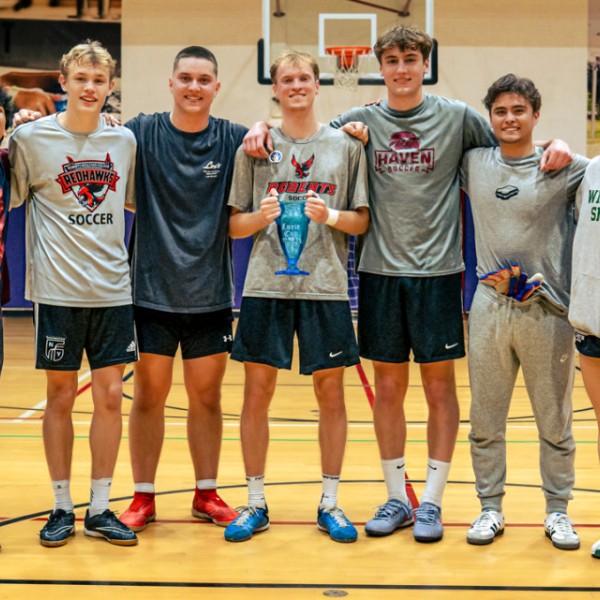Seven new grants funded by the Polson Institute for Global Development will advance Global Development’s signature strengths in wellbeing and inclusion; environmental sustainability; and food and nutritional security.
The collaborations have a global reach, ranging from diversity trainings for agricultural leaders in New York and public scholarship collaboration across the Americas to climate futures, environmental justice, and smallholder farmer soil health in Africa.
This semester’s awardees build on several priorities for the department, incorporating undergraduate and graduate education alongside our work in research and extension according to Mildred Warner, professor of city and regional planning and global development and director of the Polson Institute.
One newly funded initiative will create space for undergraduate students to serve as junior researchers and collaborate with smallholder farmers in Mali to improve fonio productivity through agronomy in a gender-responsive way.
“Faculty and students are at the core of our mission in Global Development,” said Warner. “We are thrilled to support collaborations that build bridges between research, teaching, and extension in the department.”
The new grants build on Polson Institute’s progress this year towards integrating students in faculty-led initiatives. For example, earlier in the year, Polson supported Gretchen Hanson, MPS ’23 as she performed research in Ghana on a project called Generating Revenues & Opportunities for Women to Improve Nutrition in Ghana (GROWING). The partnership was made possible thanks to Jan Low, an adjunct professor in Global Development and principal scientist with the International Potato Center (CIP) based in Kenya.
“Whether it be agricultural development in Ghana or upstate New York, people are always at the center of development interventions,” said Hanson. “Finding new ways to be inclusive of all voices and embrace existing community-based knowledge was one of the most valuable things I learned working with CIP.”
Another highlight from 2023 was hosting Polson’s inaugural Distinguished Speaker, Nik Heynen, who delivered a three-day seminar on Abolition Ecology, held office hours for interested graduate students, and presented at the Critical Development seminar series. A Distinguished Research Professor in the Department of Geography at the University of Georgia, Heynen’s research explores areas of urban political ecology, abolition ecologies, and geographies of neoliberalism and racial capitalism.
“Research, teaching and extension in the Department of Global Development explore the intersection of environment, agriculture and critical social theory. Polson grants support new collaborations at this intersection here at Cornell and around the world,” said Warner.
Collaborative Grants
Imagining Just Environmental and Climate Futures in Africa
The African continent is already experiencing climate change impacts, including drought, floods, biodiversity decline and loss of human lives. At the same time, Africa is one of the lowest contributors to climate change, while struggling to pay for climate change adaptation. Historical injustices have created structural inequities, and climate-related initiatives often mirror colonial and post-colonial power dynamics. Ongoing extractive industries look to Africa for resources, including minerals for renewable alternatives to fossil fuels. Many of these extractions lead to polluted land, water and air, yet not always supporting economic growth. Despite this bleak picture, alternative models are emerging as ways to imagine just environmental and climate futures in Africa. This project involves organizing a 2-day symposium and related publication on these topics, with the Institute for African Development. Graduate students in Development Studies will be hired to help plan the event and coordinate the special issue or edited volume.
- PI: Rachel Bezner Kerr
- Collaborators: Institute of African Development, doctoral summer RA
Advancing a South-North Dialogue to Strengthen Extension and Public Engagement
Scholars and practitioners across the world are critically rethinking higher education’s extension and community engagement work. In this project, we propose to advance a South-North dialogue on this theme by bringing to Cornell two innovative leaders from Uruguay for a three-month residency as visiting scholars during the fall 2024 semester to help us shape and implement an innovative research and teaching initiative that cuts across all of GDEV’s signature strengths. The three components of the initiative include: (1) planning an international conference and related book, to be published in the Cornell University Press book series that Scott Peters co-edits; (2) organizing research seminars and extension practitioner workshops for GDEV and broader Cornell community; and (3) planning an undergraduate engaged learning class that will be offered during the spring 2025 semester with the Universidad de la República in Uruguay.
- PI: Scott Peters
- Collaborators: Mary Jo Dudley, Heidi Mouillesseaux-Kunzman, David L. Kay, Maricelis Acevedo, Matias Flores Gonzalez (PhD student), Carolina Osorio-Gil (PhD student)
Agronomic and Gender-responsive Smallholder Fonio Productivity Improvement in Mali
This project will foster collaboration between Global Development undergraduate students, graduate students, international agricultural research, and extension practitioners. Two undergraduate students and one graduate student will join an on-going action-research project that tests improved organic fonio production practices with smallholder farmers in Douentza, Mali.
Students will join Cornell faculty and a Malian NGO as junior researchers to i) analyze the collected data from the multi-year tests, ii) design a gender-responsive survey for farmers to assess the tests, iii) analyze the survey findings, iv) draft recommendations for the Malian extension service to scale the farmer-approved practices, and v) assist in writing a scientific article.
The project will fund a summer internship for two undergraduates, part-time graduate student work, implementation of the survey by the Malian NGO, and a student-led workshop to share their findings with their peers and the wider Department.
- PI: Erika Styger
- Collaborators: Aubryn Sidle
Small Grants
Promoting Global South-North Dialogue on the Past, Present, and Future of Extension and Community Engagement
Higher education’s extension and community engagement is a practice developed globally. However, the current academic debate and research is concentrated in Global North experiences, conferences, and Journals, most of them in English. The goals of this project are to consolidate two research collaborations on extension and community engagement with two public universities in Uruguay and South Africa and to explore and analyze the implications of a Cornell Global Learning experience in Ecuador. The main tasks include 1) Workshops on Global Dialogue in Uruguay and South Africa; and 2) Historical research and Participant Observation in Ecuador. This project contributes to CALS’s Roadmap to 2050’s strategic action plan on extension and outreach.
- PI: Scott Peters
- Collaborators: Matias Gonzalez Flores (PhD student)
Diversity and Inclusion Training for LeadNY Class 20
The Learner’s Group is conducting a Diversity, Equity, and Inclusion (DEI) workshop in February 2024 for the LeadNY Program, sponsored by the Polson Institute at Cornell and Farm Credit East. The workshop aims to provide participants with valuable insights on DEI concepts and their practical applications in the workplace. The workshop will focus on Moving Beyond Unconscious Bias and Leading for Inclusion and Engagement. Participants will learn about the importance of DEI in their organizations and communities, how to identify and address biases, and how to create an inclusive environment. The workshop will be led by experienced professionals in the field of DEI, who will provide participants with valuable insights and practical tools to help them create more diverse, equitable, and inclusive organizations. In continuous operation for 40 years, LeadNY is a premier leadership development program for adult professionals in the food, agriculture and natural resource sectors of the Northeast.
- PI: Lawrence Van De Valk
- Collaborators: LeadNY, The Learner’s Group (TLG), Farm Credit East, ACA (FCE)
Using SMS Reminders and Social Norms to Improve Farmer Soil Health Salience
Eastern African policymakers have largely focused on policies that involve subsidizing seed and fertilizer inputs for short-term crop production gains, ignoring more holistic approaches that can increase smallholder farmers’ crop production, improve their livelihoods, and enhance resilience to droughts and other growing condition shocks. One such approach is integrated soil fertility management (ISFM). In partnership with Development in Gardening (DIG), a Western Kenya based non-governmental organization that conducts ISFM training with farmers, we assess the power of social norms and reminders. We test whether sending weekly SMS (text) message reminders framed around community social norms can increase the salience of soil health to farmers and sustain training interventions over multiple seasons. This project involves collection of soil samples in collaboration with students from Maseno University (Kenya), household surveys developed with DIG, and focus group discussions facilitated by Maseno and DIG to understand how farmers conceptualize soil health.
- PIs: Kurt Waldman, Jordan Blekking
Working Groups
Food Systems Transformations: Pathways and Methods
The terms 'transition' and 'transformation' have emerged as buzzwords, signifying the imperative need for changes to nurture sustainable, resilient and just food systems. This Research Working Group aims to delve into the nuanced interpretations of these concepts within scientific literature, exploring their origins, pathways and methods through a reading group and organizing a transformation method’s workshop. A food systems transition and food systems transformation are not mutually exclusive but rather offer complementary insights into describing and facilitating radical and non-linear societal changes. Researchers intend to reveal how the perspectives and approaches associated with these concepts can enrich one another, contributing to the design of pathways for sustainable, resilient and just food systems. Furthermore, they seek to stimulate interdisciplinary discussions, facilitate knowledge exchange, and cultivate skills that contribute to support transformative research within Cornell University and beyond.
- Collaborators: Whitman Barrett (PhD student, Plant Science), Maria Boa Alvarado (PhD student, Development Studies), Françoise Cattaneo (PhD student, Nutrition), Matthew Gibson (Postdoctoral Associate), Daniel Mason D'Croz (Senior Research Associate, Global Development), Kristina Sokourenko (PhD student, Development Studies), Steven Wolf (Associate Professor, Natural Resources and the Environment)
Kelly Merchan is a communications specialist in the Department of Global Development in the College of Agriculture and Life Sciences.





